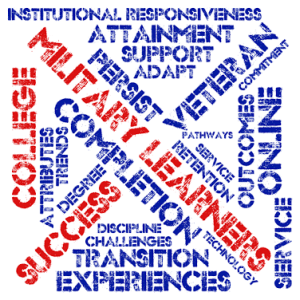Literature Review Examines Evolving Military Learner Population
Is your institution prepared to meet the needs of current generation military learners? Each year an average of 300,000 degree-seeking active-duty service members attend college courses through the Department of Defense’s Voluntary Education Program. By comparison, the U.S. Department of Veterans Affairs reported more than one million beneficiaries in 2013 across all available GI Bill chapters. The largest increases occurred following the enactment of the Post-9/11 Veterans Educational Assistance Act of 2008, which significantly expanded educational benefits to qualifying military veterans. The continuing influx of veterans pursuing higher education opportunities has prompted increased interest among academic and public policy researchers, administrators, and faculty in the college experiences and outcomes of current generation military learners, particularly student veterans. The Online Learning Journal proposed a call for papers about online military journals to counter the fact that current published research does not specifically address the Post-9/11 military learner in the context of online learning environments.
Given UMUC’s distinguished history as a military-friendly university and major provider of online degree programs, my colleagues, Dr. Karen Vignare, Dr. Thomas Bailey and I were delighted to contribute our collective efforts to the publication of the Online Learning Journal Special Issue: Serving those who Serve. I co-authored, along with Dr. Vignare, The Evolving Military Learner Population: A Review of the Literature. Our goal for this review was to synthesize and distill empirical research findings and data from both the scholarly and grey literature pertaining to the attributes, college experiences, and outcomes of the Post-9/11 military learner. We also examined institutional responsiveness to the influx of student veterans. We framed our findings from the literature using adult transition theory and more recently proposed multi-theoretical learner persistence models. We believe these models may be more useful in understanding the attributes, mobility, deployment stop outs, and college transfer patterns of current generation military learners, the institution’s role in retention, and the proliferation of online learning that has occurred over the past two decades.
The number of peer-reviewed scholarly research studies on current generation military learners pursuing most or all of their courses online was extremely limited. Several key themes emerged from an expanded review that also included practitioner focused journals, government data sources, informed commentary from higher education associations and think tanks, and a number of quality doctoral dissertations documenting the lived experiences of military learners.
- Demographic and college outcomes profiles for military learners were most similar to nontraditional, first-generation learners, although military learners face additional challenges associated with service or combat-related traumas, injuries, and disabilities.
- Like other nontraditional learners, military learners have become increasingly reliant on online learning opportunities.
- Intersecting community memberships, role identities, and commitments often complicate the transition to college and perceived sense of fit for student veterans. While this finding was more pronounced in the research involving learners who attended campuses predominately serving traditional students, the significant lack of research examining online military learners limited further comparative analysis.
- Military learners adapt and persist in college by drawing upon deeply engrained military traits and tendencies, including self-discipline, mission-first focus, and reliance on fellow military learners.
- For online military learners on active duty, especially those in field roles or forward duty areas “outside the wire,” barriers were frequently situational and included
communication blackouts, harsh, stressful working conditions, and long, unpredictable work hours. - A key hallmark of quality access according to OLC is “intuitive navigability.” Although some military learners found that their chosen institutions lacked this intuitive navigability, recent data suggests that many institutions have made significant effort in recent years to improve access and the college experiences afforded to military learners, especially Post-9/11 student veterans.
We invite you to read the full review and our discussion on the need for mutually adaptive student success models that position institutions as responsive learning partners at key junctures during the learner’s transition to college and his or her progression through college. As noted in our review, there is a need for additional peer-reviewed research examining the college experiences, service utilization, and persistence of current generation military learners who pursue their degrees online. We encourage you to read all the articles in the January 2015 special issue of Online Learning.
Kate Ford is the Director of Information & Research Analysis for University of Maryland University’s Center for Innovation in Learning and Student Success, where she is responsible for environmental scanning and reporting on research, trends, tools, policy issues, and other topics related to learning innovation. During her 16 years with UMUC, Ms. Ford has held a variety of leadership and technical roles focused on academic technology integration, delivery of online instruction, and faculty training. Her contributions to the development and support of UMUC’s online faculty have been recognized by IMS Global Learning Consortium and the Instructional Technology Council. Ms. Ford holds an MBA and Master of Science in Management from UMUC and a Bachelor of Science in Journalism from the University of Maryland, College Park.
Karen Vignare, Ph.D., is Vice Provost and head of Center for Innovation in Learning and Student Success at University of Maryland University College (UMUC). She has been involved in online learning for more than 15 years. Her research has been funded by the Bill & Melinda Gates Foundation, the Hewlett Foundation and USAID, and she has published and presented on topics ranging from international education and knowledge organization to evaluation and assessment of learning, online learning and blended learning. Before joining UMUC in June 2013, Dr. Vignare was director of project design and implementation at Michigan State University’s MSUglobal, where she focused on the use of open educational resources and competency-based approaches in international education, training, and development. Dr. Vignare earned a Ph.D. in Computer Technology and Education from Nova Southeastern University, an MBA from the Simon School at the University of Rochester in New York, and a BS in Political Science and Economics from Frostburg State University in Maryland.
Special Note: Recordings are available from the OLC (formerly Sloan-C) 2014 Webinar Series: Increasing Online Student Success & Retention For Members Of The Military. Click to access each of the 4 webinars below.
- Executive Panel: Overview of Current & Pending Federal Regulations for the Post 9/11 GI Bill, DoD Tuition Assistance, Retention/Graduation Rates & Compliance
- Student & Alumni Panel: What Veterans & Servicemembers Want Faculty & Administrators to Know about Online Education
- Campus Administrative Panel: Meeting the Diverse Needs of Veterans, Servicemembers & Military Family Members Enrolled in Online Education
- Research Panel: Supporting Online Student Success For Veterans, Service & Military Family Members





